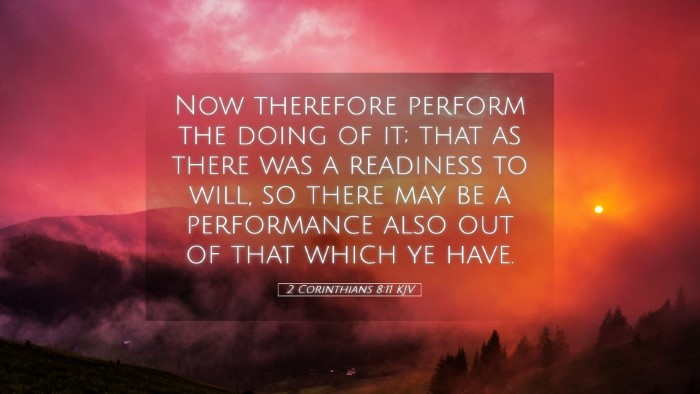Commentary on 2 Corinthians 8:11
2 Corinthians 8:11 states:
"Now therefore perform the doing of it; that as there was a readiness to will, so there may be a performance also out of that which ye have."
Introduction
This verse from Paul's second letter to the Corinthians addresses the importance of action aligned with intention, particularly in the context of generosity and giving to those in need. Paul urges the Corinthians to not only express their willingness to assist but to actively carry out their intentions.
Contextual Background
In the broader context of 2 Corinthians 8, Paul discusses the collection for the impoverished church in Jerusalem. The Corinthian church had previously shown eagerness to contribute, yet Paul emphasizes the need for them to follow through with their commitment.
Theological Insights
- Readiness to Will: The phrase "readiness to will" indicates the initial desire or intention to help. This reveals an essential aspect of Christian character—willingness to respond to God's call to generosity, which aligns with the teachings of Jesus (Matthew 6:21).
- Performance of Good Works: Paul calls for the "performance" of their intentions. This highlights the idea that faith is not merely about belief but must also translate into tangible actions (James 2:17).
- Accountability in Giving: Paul fosters a sense of accountability. He communicates that it is not enough to wish well but to act on those wishes. This notion is echoed in Matthew Henry's commentary, where he discusses the necessity of fulfilling one’s commitments in the context of Christian duty.
Commentary Insights
According to Matthew Henry, this verse illustrates the transition from intention to action. He states, "Good resolutions without performance will not profit; the performance gives life and value to the purpose.” This underlines that the act of giving must be consistent with the initial plan of support that the Corinthians had expressed.
Albert Barnes amplifies this idea by stating that it is not only the will but also the execution that is essential in Christian life. He asserts that a “good intention without performance is like a body without a spirit.” Therefore, the act of charity must follow the expression of goodwill, reinforcing the relationship between faith and works.
Adam Clarke takes this further by explaining the consequences of failing to act on our promises. He details how a delay or failure in fulfilling such commitments can lead to skepticism or a questioning of the faithfulness of one’s Christian practice. Clarke emphasizes Paul’s intention to stir the hearts of the Corinthians to act promptly, illustrating how readiness should culminate in action.
Practical Implications for Believers
- Encouragement for Action: For pastors and church leaders, this verse serves as a strong reminder of the necessity of following through on commitments made to the community, serving as an encouragement for congregants to put their faith into action.
- Holistic Discipleship: Discipleship involves not merely believing or desiring to help but requires that one intentionally takes steps to fulfill these desires. This creates a culture of accountability and action within the church family.
- Community Assurance: Can we assure our communities that our expressions of readiness to help will be backed with action? This challenge is vital for cultivating trust and a spirit of genuine care within the body of Christ.
Conclusion
In summary, 2 Corinthians 8:11 serves as a pivotal directive for the church, calling believers to align their intentions with actions. The insights from these public domain commentaries help create a comprehensive understanding for pastors, students, and theologians alike, emphasizing the necessity of commitment and execution in the life of faith.
Ultimately, this verse invites believers to reflect on their generosity, urging them to move beyond mere willingness to tangible, meaningful contributions that glorify God and uplift the community.


